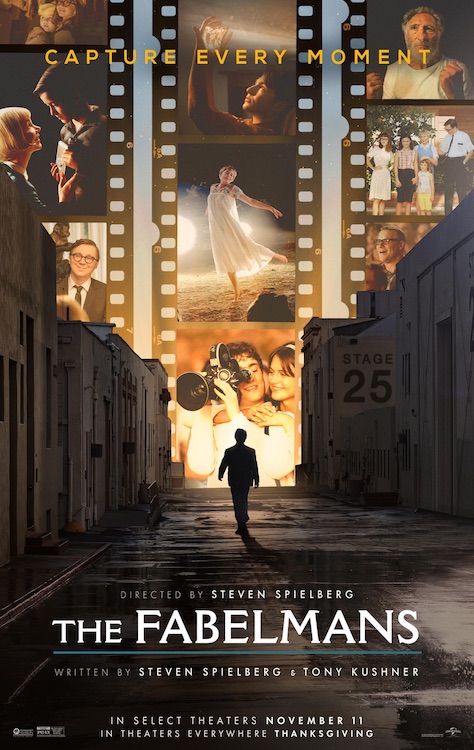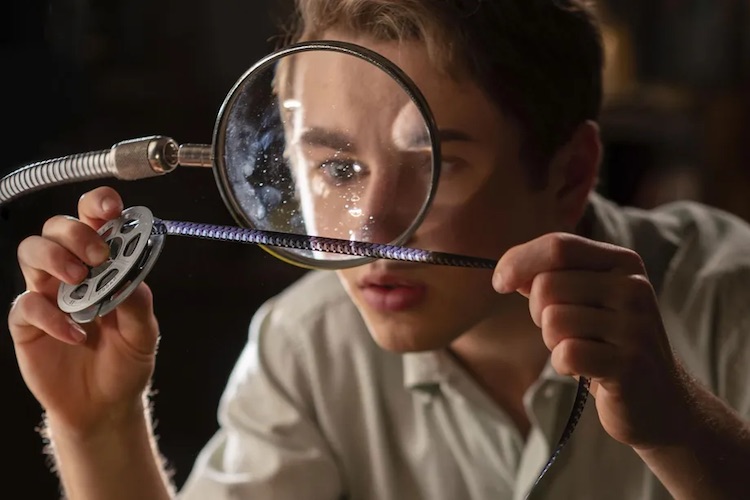Stephen King once wrote: “Life is not a support system for art. It’s the other way around.” It is a quote that came to mind shortly after watching The Fabelmans, Steven Spielberg’s late-period masterpiece, a thinly veiled autobiography chronicling the birth of a young artist and the implosion of his family.
If anyone could be forgiven for making a gauzy ode to the movies and the power the big screen holds over us, it’s the man behind many of Hollywood’s generation-defining spectacles. But The Fablemans is not about the joys of escapism or the fun of making movies, although those ideas do creep in. Rather, it’s a film about art and its relationship to life; how it helps us process the truth, how it can enlighten and destroy, its role as a shield and a tool for control, and the way it sometimes serves as a relational barrier. On top of that, it’s a love letter to Spielberg’s parents, told with sometimes brutal honesty, but never lacking in appreciation or admiration. It’s the director’s most personal film, and it might be among his best.

The film opens on a fateful January night in 1952, when young Sammy Fabelman is taken to his first movie, The Greatest Show on Earth. Prior to the show, as Sammy stands in line outside the theater, his parents prepare the nervous child for what he’s about to encounter, with his computer engineer father, Burt (Paul Dano), explaining the technical aspects of how movies work and his mother, Mitzi (Michelle Williams), breathlessly whispering that movies are dreams. The sequence sets up the tension Sam will wrestle with throughout his life between his father’s pragmatism and his mother’s passion, all filtered through a love for cinema. .
Sam wakes his mother shortly after seeing the movie to declare that he wants a train set for Hanukkah. He’s both fascinated and terrified by the movie’s spectacle, and wants to smash his set up so that he can understand and control the crashes that scare him. When Mitzi places his father’s movie camera in his hands to allow him to crash the train once, Sam never puts it down.
Light on plot, the film is instead structured as a lightly fictionalized memoir, a series of vignettes that shed light both on Sam’s growing love of film and skill behind the camera and his parents’ disintegrating relationship. Burt and Mitzi love each other, but sometimes that love isn’t enough. Ever rational, soft-spoken Burt lavishes his family with gifts and attention, but they’re his attempts to find easy solutions to problems that might not have them. Mitzi is a talented artist who could have played the world’s biggest stages, but she gave it up for a house in the suburbs. She loves her family, but she searches for something transcendent, powerful and meaningful.
Those who’ve seen the 2017 documentary Spielberg are already aware of the secrets that plagued Spielberg’s family, about how his mother and father divorced because of an affair she had with a family friend (here, the family’s “uncle” Bennie, played by Seth Rogen). But, with The Fabelmans, the director reveals (and, in interviews, has confirmed) that he knew more than he let on. There’s a scene halfway through where Sam reviews home movies and notices a closeness between Mitzi and Bennie that he hasn’t considered before, and he confronts his mother with the evidence.
The film is vague as to what happens as Mitzi views the footage. Is it proof of an affair? Or does the film reveal feelings that she was previously unaware of, or at least thought she’d been hiding? It’s interesting that Sam doesn’t see what’s in front of him until he looks at it on film, and likewise Mitzi might not realize the depths of her own feelings until her son captures it. Throughout the film, Spielberg presents film as a tool to help Sammy process life, connect with others, curry favor and get revenge. Sam has a knack for creating emotional impact, but he also fears it might be what destroys his family.
In some ways, this is the closest we’ll likely get to Spielberg teaching us his tricks of the trade, and he takes great care in capturing Sam’s understanding of cinematic language. He uses piles of dirt on sticks to catapult debris into the air and pokes holes in the film to simulate gunfire for his war movies. Late in the film, he crafts comedic set pieces and uses a variety of tools to create a senior movie that gets revenge on one bully while building another up as a god; the latter’s reaction — along with Sam’s own confusion as to his motives — is Spielberg’s testimony to the power and mystery of cinematic manipulation. For Spielberg, a director who seems to have a preternatural sense of cinema’s emotional power, it seems to be a confession that he isn’t always sure whether he directs with his heart or his head; his parents still wrestle within him.
The perceptive, tender script by Spielberg and Tony Kushner looks back at the director’s parents and presents them in all their complexity, never judging but never soft-pedaling. The film’s compassion toward Burt, a man doing his best to save a marriage with an unfixable foundation, feels like a resolution to the deadbeat dad themes that plagued Spielberg’s early filmography. Likewise, it’s easy to see how the carefree, lively Mitzi could be a mother kids embrace in their younger years, but as her problems become more apparent and her mental health deteriorates, Spielberg observes his mother with more nuance but never without love. Paul Dano and Michelle Williams do solid work, with the former portraying a kind but wispy man who’s an intellectual giant but emotional novice; there’s a shot late in the film in which Burt silently reacts to a photo of the wife he’s lost, and Dano sells the heartbreak. As Mitzi, Williams creates a larger-than-life personality who dominates every room, even though she can’t quite hide the frailty and fear just behind her giant smile. Williams does powerful work, and the film is among her best. A sequence where she dances in her nightgown in front of her car’s headlights presents Mitzi in all her complexity; a bit bizarre and possibly lacking self-awareness (as her daughter points out, horrified, everyone can see through her dress), but also graceful and swept up in the moment.

Gabriel LaBelle in “The Fabelmans.” © 2022 Universal Studios and Amblin Entertainment.
The film can never divorce the family conflict from Sammy’s overpowering love of film. It’s Mitzi who first plants the seeds of cinematic love in Sam’s head, and one gets the sense that her love of whimsy fueled Spielberg’s knack for creating wonder. While Burt could come across as a disapproving father, he’s also the one who supplies Sam with the tools he needs, sometimes with his own selfish means in mind, and finds a connection when he realizes that Sam’s work as a director has parallels to his career as a project manager. At one point, a great-uncle — Judd Hirsch in a film-stealing performance — comes to stay with the Fabelmans after the death of Mitzi’s mother. The grizzled, potentially crazy old man says he was once a circus lion tamer before working in the movies. His appearance allows Sam not only to better understand how his burgeoning passion could put him at odds with his family, but also gives insight into his mother’s turmoil; Uncle Boris says that art and family will tear the young man apart, and suggests that Sam might actually love the former more than the latter. Spielberg doesn’t dispute this, and a scene late in the film where Mitzi and Burt announce their divorce and Sam imagines himself filming his family’s reactions hints at the way cinema serves as both a tool for understanding and a barrier to emotion.
Even as he balances the family drama, Spielberg lavishes attention on details of the world that made him. In the film’s back half, Gabriel Labelle portrays teenage Sam, and he deftly navigates the story’s toughest material. In addition to his parents’ dying marriage, Sam must also endure life at a new school, where he encounters anti-Semitic bullies and navigates his first romantic relationship. The film handles these moments with insight and humor; it’s worth noting that this is one of Spielberg’s funniest movies, particularly when Sam begins dating a very Christian girl, or in the film’s final sequence, in which Sam finally sits down with a legendary filmmaker (a cameo by another legendary filmmaker). Throughout, there are brief nods that suggest Spielberg knows he’s filtering his story through the lens of a “Steven Spielberg movie,” and there are visual callbacks to several of his films; the film’s final shot is a delightful little bow, acknowledging that he can’t quite stay away from his happy endings while also admitting that, yes, he still has to remember to keep the basics in mind.
For a director who is so often associated with larger-than-life spectacles, The Fabelmans might seem like a minor work. And yet, when considering the naked earnestness that fueled those large films as well as the more intimate, adult-oriented work he’s done in recent years, the film feels more like a summation. Spielberg’s only 75 years old and hopefully has several more movies in front of him; but if he decided to retire and make The Fablemans his final work, it would be a fitting capstone on one of Hollywood’s greatest careers.

| Producer: | Tony Kushner, Kristie Macosko Krieger, Steven Spielberg |
| Release Date: | November 23, 2022 |
| Running Time: | 151 minutes |
| Starring: | Michelle Williams, Paul Dano, Seth Rogen, Gabriel LaBelle, Jeannie Berlin, Julia Butters, Robin Bartlett, Keeley Karsten, Judd Hirsch, Oakes Fegley, Gabriel Bateman, Nicolas Cantu, Gustavo Escobar, David Lynch, Chloe East, Sam Rechner |
| Writer: | Steven Spielberg, Tony Kushner |
| MPAA Rating: | PG-13 (for some strong language, thematic elements, brief violence and drug use) |
| Director: | Steven Spielberg |
| Distributor: | Universal Pictures |
| External Info: | Official Site / Facebook / Instagram / Twitter |
